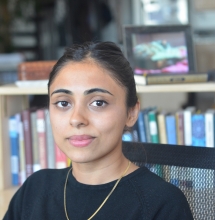Assistant Professor of English
 Contact: fburney@ucmerced.edu
Contact: fburney@ucmerced.edu
Fatima Burney is a scholar of global romanticism and world poetry. She received her doctoral degree in Comparative Literature from the University of California Los Angeles (2017) and was a postdoctoral fellow with the Multilingual Locals and Significant Geographies project at SOAS (2017-2020) before joining UC Merced in 2020.
While Burney’s teaching revolves around materials written in (or translated into) English, her research is multilingual (English, Urdu, Persian) and considers the relational dynamics between languages and language cultures. It is especially interested in how the 'rise' of English—from the language of a small island nation to a global lingua franca of historically unprecedented scale—has resulted in anglophone ‘norms and forms’ becoming part of the conceptual infrastructure through which the possibilities of intercultural understanding are filtered. Against this backdrop, Burney’s work reframes global anglophone as a ‘frontier phenomenon’ that was mutable to the diverse contexts in which English has become vernacularized. In other words, where some scholars envision anglophone culture diffusing outwards from centers of imperial power to the geographical ‘margins’, this research highlights the multilingual processes of translation, philology, and colonial language pedagogy that reshaped the anglophone sphere from the frontier inwards. This comparative framework especially emphasizes the idealized position of borderlands and folk culture in global romanticism. Through a ‘frontier-forward’ approach, this research seeks to denaturalize the aesthetic and ideological norms of anglophone literariness that have a present monopoly in the field. Burney’s work has been published in the Journal of World Literature, Comparative Critical Studies, Philological Encounters, American Literary Review and Comparative Literature Studies. She was also the coeditor of the special issue “West-East Lyric: A Comparative Approach to Lyric History”. She is currently working on a book that historicizes the lyricization of the ghazal in anglophone debates on world poetry. You can peruse some of her articles below, or through her personal website.
“Persian, Urdu, and English: Triangulating Postcolonial Literary History” in Comparative Literature Studies (September 2024)
“The Veil of Purity: Tropes of Nineteenth-Century Islamic Reform and Ahmad Khan’s naicar” in The Late Persianate World: Transregional Connections and the Question of Language, a special issue of Philological Encounters (October 2023)
Review of Emerson in Iran: American Appropriations of Persian Poetry by Roger Sedarat, American Literary History (October 2021)
“Strategies of Sound and Stringing in Ebenezer Pocock’s West-East Verse” The West-Eastern Lyric: A Comparative approach to Lyric History, a special issue of Comparative Critical Studies (June 2020)
“Introduction” with Sara Hakeem Grewal. The West-Eastern Lyric: A Comparative approach to Lyric History, a special issue of Comparative Critical Studies (June 2020)
“Locating the World in Metaphysical Poetry: The Bardification of Hafiz,” Journal of World Literature 4.2: 149–168. (June 2019)



